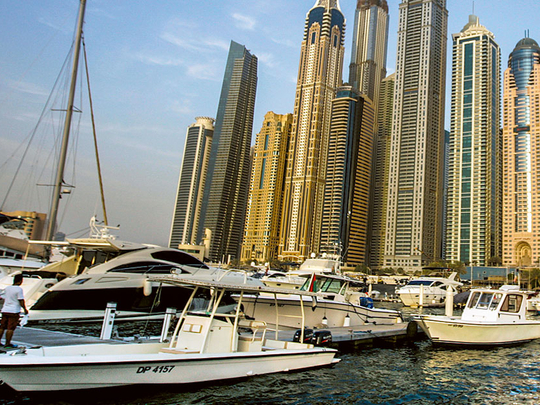
Dubai: Realty prices seem to be softening during the second half this year.
Analysts forecast that the Dubai real estate market is expected to face a further downward pressure during the second half of 2015, which might attract more buyers who would see the investment under value.
However, it might also push certain developers outside the market.
The drop in prices is seen by experts as a “correction” to the inflation that took place, rather than a market crisis.
“We believe companies have the possibility to adjust the pricing of their products if the supply volume remains so high and there is pressure on the sales price,” said Franck Delage, director of corporate ratings for Europe, the Middle East and Africa at Standards & Poor’s.
Decline in sales activity can be traced back to the fourth quarter of 2014 when fluctuations in oil prices impacted investor sentiments. According to analysts, the prices were high and unsustainable; hence, the ongoing price reductions are an adjustment within the market.
Al Barari, Dubai Marina, Downtown Dubai and Arabian Ranches decreased the most by 20 per cent, according to Kendal, a real estate firm. Properties such as Emirates Living (The Springs, The Lakes, The Meadows) and Jumeirah Lake Towers have decreased by 10-15 per cent. Prices in Downtown Dubai have seen the major drop due to their sharp increase.
The prices around Dubai, according to JLL and Standard & Poors, are forecast to further drop by 10 per cent. Analysts say the prices are expected to further drop until the end of the year, if all current circumstances stay the same.
“The major decrease in prices took place in villa and luxury houses, This is due to increased supply coming in from various new projects launched over the last three years, some of which were recently completed, currently off-plan or near completion. These new projects are offering many attractive deals & opportunities to investors including some deals being sold at negative premiums from what they were originally purchased at,” said Keone Sernandes, a sales leasing and consultant at Ocean View Properties, a real estate firm in Dubai.
According to Ocean View, a decline has been seen all across Dubai with less popular developments like Dubai Sports City, Business Bay, Jumeirah Village Circle.
“These new and upcoming developments will have to offer buyers superior quality products at very good prices and payment plans as buyers now are looking for more value for their money and would prefer to buy in more established communities unless they are being offered deals they cannot refuse,” said Fernandes.
Gibran Bukhari, CEO of real estate firm Provident Estate said the decline in prices is seen in properties that do not have proper infrastructure such as areas where there are lack of schools, or proper greenery.
“The major realistic correction of the prices took place in Jumeirah Village Circle, Jumeirah Village Triangle, Dubailand and Business Bay,” said Bukhari.
Impact of oil
Due to the impact of oil prices, the overall market has been affected in Dubai which could be a reason why people are reluctant to buy. However, as oil prices drop, we see the real estate market readjusting or “correcting” the previously fluctuated prices.
S & P forecast in June that oil prices will remain weak to the end of 2016. Hence, they expect that overall economic growth in the UAE will likely slow markedly. The agency said Dubai’s stock index would likely to affect investor views on property.
“The fluctuation in oil prices has impacted investor sentiment which has in turn impacted sales activity, where we saw a slowdown in transaction activity. This slowdown saw real estate prices drop marginally to levels that appeal to end-users in the market,” said Dana Salbak, Real Estate Research Manager at JLL Middle East and North Africa (MENA). Salbak, added that JLL expects to see a further 10 per cent drop sale prices in 2015.
Dana explained further that the levels of decline in transaction activity have resulted in a single-digit decline in sale prices, contrary to the major declines seen in 2008-2009 “making way for more end-user investors as opposed to speculative investors”.
People buy properties in Dubai either as investors or end use investors. End-use investors have become more hesitant to buy in the Dubai market. According to Danny Terry, Managing Director of Kendal firm, their hesitation is due to the drop in prices, as they wait for the lowest the prices can get.
Meanwhile, Terry explains, the investors market has slowed down due to the government’s regulation. The Dubai government has cracked down on flipping of off-plan properties which is buying off plan homes and then selling them before completing the project.
“The government also has become stricter on powers of attorney; those are people who buy property on power of attorney and then not transferring it to save on the transfer fees,” Terry said. The transfer fee has been doubled to four per cent, in an attempt to stop people from making a quick sale to make a small profit.
According to him, the government rules have stabilised the market.
— Omnia Ibrahim is a trainee at Gulf News












